外交学概论 2
- 格式:ppt
- 大小:767.00 KB
- 文档页数:41

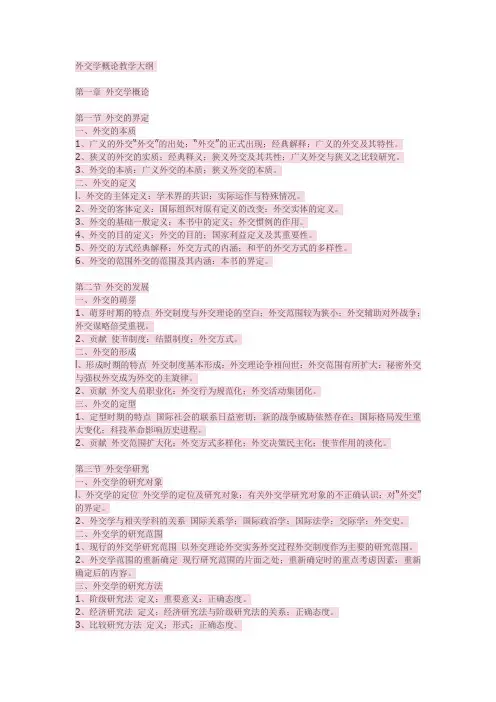
外交学概论教学大纲第一章外交学概论第一节外交的界定一、外交的本质1、广义的外交“外交”的出处;“外交”的正式出现;经典解释;广义的外交及其特性。
2、狭义的外交的实质;经典释义;狭义外交及其共性;广义外交与狭义之比较研究。
3、外交的本质:广义外交的本质;狭义外交的本质。
二、外交的定义l、外交的主体定义:学术界的共识;实际运作与特殊情况。
2、外交的客体定义:国际组织对原有定义的改变:外交实体的定义。
3、外交的基础一般定义:本书中的定义;外交惯例的作用。
4、外交的目的定义:外交的目的;国家利益定义及其重要性。
5、外交的方式经典解释:外交方式的内涵;和平的外交方式的多样性。
6、外交的范围外交的范围及其内涵:本书的界定。
第二节外交的发展一、外交的萌芽1、萌芽时期的特点外交制度与外交理论的空白;外交范围较为狭小;外交辅助对外战争;外交谋略倍受重视。
2、贡献使节制度:结盟制度:外交方式。
二、外交的形成l、形成时期的特点外交制度基本形成:外交理论争相问世:外交范围有所扩大:秘密外交与强权外交成为外交的主旋律。
2、贡献外交人员职业化:外交行为规范化;外交活动集团化。
三、外交的定型1、定型时期的特点国际社会的联系日益密切;新的战争威胁依然存在;国际格局发生重大变化;科技革命影响历史进程。
2、贡献外交范围扩大化;外交方式多样化;外交决策民主化;使节作用的淡化。
第三节外交学研究一、外交学的研究对象l、外交学的定位外交学的定位及研究对象;有关外交学研究对象的不正确认识:对“外交”的界定。
2、外交学与相关学科的关系国际关系学;国际政治学;国际法学;交际学;外交史。
二、外交学的研究范围1、现行的外交学研究范围以外交理论外交实务外交过程外交制度作为主要的研究范围。
2、外交学范围的重新确定现行研究范围的片面之处;重新确定时的重点考虑因素:重新确定后的内容。
三、外交学的研究方法1、阶级研究法定义:重要意义:正确态度。
2、经济研究法定义;经济研究法与阶级研究法的关系;正确态度。

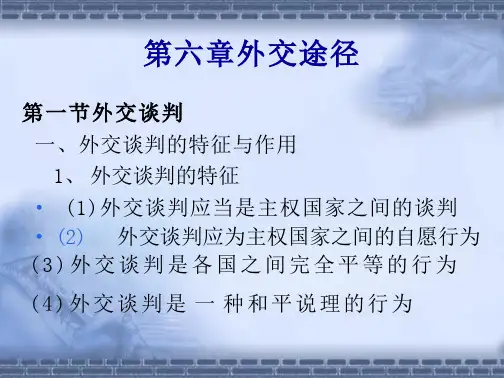
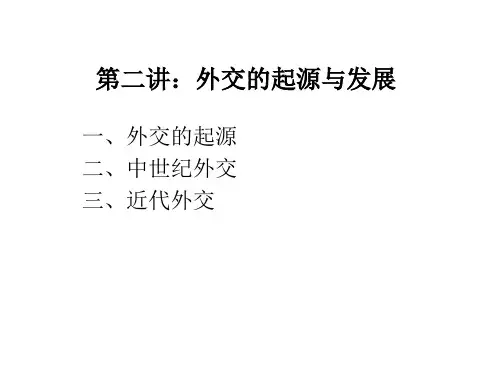
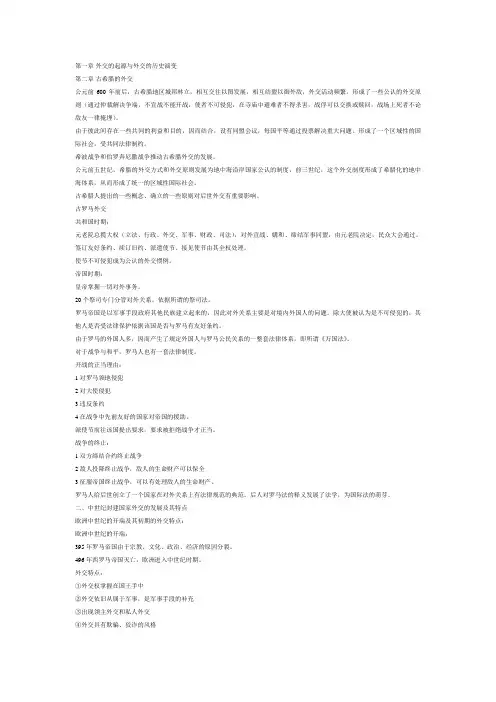
第一章外交的起源与外交的历史演变第二章古希腊的外交公元前600年前后,古希腊地区城邦林立,相互交往以图发展,相互结盟以御外敌,外交活动频繁。
形成了一些公认的外交原则(通过仲裁解决争端,不宣战不能开战,使者不可侵犯,在寺庙中避难者不得杀害,战俘可以交换或赎回,战场上死者不论敌友一律掩埋)。
由于彼此间存在一些共同的利益和目的,因而结合,设有同盟会议,每国平等通过投票解决重大问题。
形成了一个区域性的国际社会,受共同法律制约。
希波战争和伯罗奔尼撒战争推动古希腊外交的发展。
公元前五世纪,希腊的外交方式和外交原则发展为地中海沿岸国家公认的制度,前三世纪,这个外交制度形成了希腊化的地中海体系,从而形成了统一的区域性国际社会。
古希腊人提出的一些概念、确立的一些原则对后世外交有重要影响。
古罗马外交共和国时期:元老院总揽大权(立法、行政、外交、军事、财政、司法),对外宣战、媾和、缔结军事同盟,由元老院决定,民众大会通过。
签订友好条约、续订旧约、派遣使节、接见使节由其全权处理。
使节不可侵犯成为公认的外交惯例。
帝国时期:皇帝掌握一切对外事务。
20个祭司专门分管对外关系。
依据所谓的祭司法。
罗马帝国是以军事手段政府其他民族建立起来的,因此对外关系主要是对境内外国人的问题。
除大使被认为是不可侵犯的,其他人是否受法律保护依据该国是否与罗马有友好条约。
由于罗马的外国人多,因而产生了规定外国人与罗马公民关系的一整套法律体系,即所谓《万国法》。
对于战争与和平,罗马人也有一套法律制度。
开战的正当理由:1对罗马领地侵犯2对大使侵犯3违反条约4在战争中先前友好的国家对帝国的援助。
派使节前往该国提出要求,要求被拒绝战争才正当。
战争的终止:1双方缔结合约终止战争2敌人投降终止战争,敌人的生命财产可以保全3征服帝国终止战争,可以有处理敌人的生命财产。
罗马人给后世创立了一个国家在对外关系上有法律规范的典范。
后人对罗马法的释义发展了法学,为国际法的萌芽。
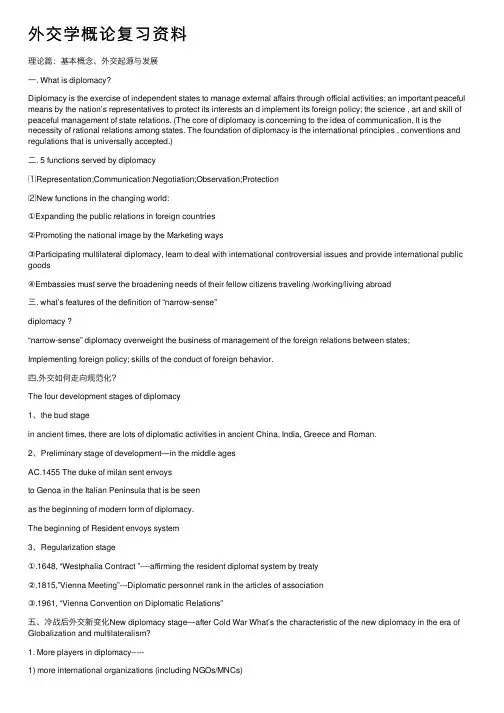
外交学概论复习资料理论篇:基本概念、外交起源与发展⼀. What is diplomacy?Diplomacy is the exercise of independent states to manage external affairs through official activities; an important peaceful means by the nation’s representatives to protect its interests an d implement its foreign policy; the science , art and skill of peaceful management of state relations. (The core of diplomacy is concerning to the idea of communication, It is the necessity of rational relations among states. The foundation of diplomacy is the international principles , conventions and regulations that is universally accepted.)⼆. 5 functions served by diplomacy⑴Representation;Communication;Negotiation;Observation;Protection⑵New functions in the changing world:①Expanding the public relations in foreign countries②Promoting the national image by the Marketing ways③Participating multilateral diplomacy, learn to deal with international controversial issues and provide international public goods④Embassies must serve the broadening needs of their fellow citizens traveling /working/living abroad三. what’s features of the definition of “narrow-sense”diplomacy ?“narrow-sense” diplomacy overweight the business of management of the foreign relations between states; Implementing foreign policy; skills of the conduct of foreign behavior.四.外交如何⾛向规范化?The four development stages of diplomacy1、the bud stagein ancient times, there are lots of diplomatic activities in ancient China, India, Greece and Roman.2、Preliminary stage of development—in the middle agesAC.1455 The duke of milan sent envoysto Genoa in the Italian Peninsula that is be seenas the beginning of modern form of diplomacy.The beginning of Resident envoys system3、Regularization stage①.1648, “Westphalia Contract ”----affirming the resident diplomat system by treaty②.1815,”Vienna Meeting”---Diplomatic personnel rank in the articles of association③.1961, “Vienna Convention on Diplomatic Relations”五、冷战后外交新变化New diplomacy stage—after Cold War What’s the characteristic of the new diplomacy in the era of Globalization and multilateralism?1. More players in diplomacy-----1) more international organizations (including NGOs/MNCs)2) more other government departments3) more individuals who are not foreign service officers (heads of states/track two diplomats/general public )2. More contents of diplomacy-----the economy/technology/environmental protection/human rights/ money laundering/refugee dumping……3. More diplomatic methods-----Typical diplomatic methods: bilateral diplomacy/professional diplomatic representatives/New methods: summit diplomacy /multilateral diplomacy/public diplomacy/internet diplomacy……4. old or new? Change or unchanged?unchanged: typical resident representatives---still important unchanged: purpose of diplomacy制度篇:外交准则、外交规则与惯例、外交机构⼀、Universally-Accepted fundamental Norms Governing Today’s diplomacy国际公认的当代外交基本准则1. Sovereign equality 主权平等2. Peaceful settlement of international disputes and non-use of force和平解决国际争端,互不使⽤武⼒The contents in the General Treaty for the Renunciation of War (1928)The contents in the UN Charter“The parties to any dispute the continuance of which is likely to endanger the maintenance of international peace and security , shall, first of all, seek a solution by negotiation, enquiry, mediation, conciliation, arbitration, judicial settlement, resort to regional agencies of arrangements , or other peaceful means of their own choice.”3. Non-interference in internal affairs of any state不⼲涉任何国家的内政what’s the principles of Chinese diplomacy?The Five Principles of Peaceful Coexistence1. mutual respect for sovereignty and territorial integrity2. mutual non-aggression3. non-interference in each other’s internal affairs4. equality and mutual benefit5. peaceful coexistence⼆、外交规则与惯例Diplomatic regulations and conventions1.外交承认含义、⽅式P235、2382.外交关系的建⽴P2403.外交代表机关的建⽴和馆长的就任P2444.外交团和外交团团长(diplomatic corps)P2685.外交特权与豁免diplomatic privileges and immunities P3346. order of precedence in diplomatic practice P326三、外交机构Modern diplomatic institutions1.The ministry of foreign affairsFunctions of the ministry of foreign affairs1) Representative as a whole2)Connection between diplomatic decision-making departments and resident institutions3)Policy recommendation and implementation2.The embassy ⼤使馆P251●The course of establishing an embassywhat’s the work of the charge d’ affaires ad interim?what’s the difference between charge d’ affaires and charge d’ affaires ad interim?●The appointment of an ambassadorWhat’s the course of appointing an ambassadorin China /the U.S./the United Kingdom?why the agreement between two countries is necessary?●Explain the core Functions of the embassy?RepresentingProtectingNegotiatingAscertainingPromoting●The composition and size of embassycomposition with ambassador as centre1) Ambassador(minister )2) Counselor (political /commercial/cultural)(charge d’ affaires )3) Foreign secretary(3)4) Diplomatic attache (attendant) /military attache5) Diplomatic agents’ spousesadministrative and technical staffSize: from 1 to 100 agents2.领事馆定义:Consulate is the representative of a government . When the government agreed by a government of another country, or according to the agreement reached with a government of another country , the consulate will be stationed in a particular city to the other country, and exercise of consular functions in a certain area.职责实践篇:外交谈判、外交⽅式(公共、⾸脑、经济)、外交官⼀、公共外交、1. What’s the public diplomacy?work aiming to inform and engage individuals and organizations overseas in order to improve understanding and strengthen influence for the state by using mass media/cultural exchange and so on.2.What’s the features of public diplomacy?1. differences from traditional diplomacy2. differences from propaganda/doc/e210924054.htmlpared with people to people diplomacy cultural diplomacy4.why does public diplomacy rise?①informationization/democratization/and civil society enhance the influence of the public ,the public is becoming more important for diplomacy②many countries take public diplomacy as the part of nationalstrategy because the soft power and national branding are more crucial for the country.5.Brief summary:①Public diplomacy is a new way that can be close to foreign public . It becomes many governments’ the important part of foreign strategy②generally speaking, public diplomacy can promote understanding among different countries’ public.③public diplomacy is the development of diplomatic institutions. The diplomatic system is forming “one body two wings”frame.④Public Diplomacy can promote foreign policy, but can’t save a flawed policy.⼆、经济外交1.定义:The decision-making, policy-making by countries or international organizations for economic interests.The decision-making, policy-making by countries or international organizations using economic methods to realize non-economic aims.2.Origin and development①before 19th century②in 1866,the foreign affairs ministry of the U.K. established commercedepartment③rising after World War Second---Japanese economic diplomacy④universal phenomenon after 1990s’3.The form of economic diplomacyEconomic cooperation:trade/finance /oilEconomic aid:physical/technical/currencyEconomic sanction:embargo/trade ceased/financial assets freeze International economic coordination:G8/G20/WTO/IMF三、⾸脑外交见下四、外交谈判1.what is diplomatic negotiation?Broad Sense:a peaceful method for the countries to deal with disputes and come to agreements.Narrow Sense:negotiation is a process in which explicit proposals are put forward publicly for the purpose of reaching agreement.2. Features of negotiations1. negotiation is like a sport, needing training and practising .2. Mixed motives: all parties participating negotiation have mutual interests (the base) as well as conflict interests (the focus).3. the course: all parties will set the highest and lowest aims for this negotiation. The final result will be in this range.4. any negotiations will be the course of joint decision-making.3. Types of negotiationsRival negotiations :dispute solvingb oundary/trade/security incident……Cooperative negotiations :establishing relations/developing relations /aid/economic projects/arms control………The negotiations in reality sometimes have mix of two types.4. key elements and skills for successful negotiationInterests, options, criteria, peoplethe skills as a whole1. Identify your interests, guess and make sure the other side’s interests.2. Set the highest and lowest aims for a negotiation and identify an explicit agenda and strategy in the negotiation.3. Expand the mutual interests by inventing some options.4. Provide the objective criteria for realizing the aims5. Listening actively and healthy communication6. Make use of the influence that your country has.7. Make sure what you should do next if the negotiations broke down. (alternative)例题1、论述⾸脑外交的含义、形式和功能?⾸脑会晤:双边⾸脑会晤的直接⽬的在于⾸脑直接参与会谈和对话,它不同于⼀般的外交磋商,是由⾸脑直接出⾯澄清国家的基本政策与战略,就国家间的基本原则达成谅解。
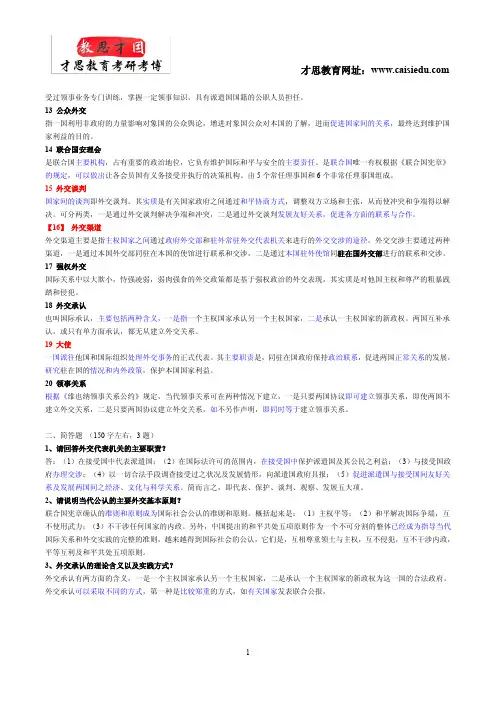
受过领事业务专门训练,掌握一定领事知识,具有派遣国国籍的公职人员担任。
13公众外交指一国利用非政府的力量影响对象国的公众舆论,增进对象国公众对本国的了解,进而促进国家间的关系,最终达到维护国家利益的目的。
14联合国安理会是联合国主要机构,占有重要的政治地位,它负有维护国际和平与安全的主要责任。
是联合国唯一有权根据《联合国宪章》的规定,可以做出让各会员国有义务接受并执行的决策机构。
由5个常任理事国和6个非常任理事国组成。
15外交谈判国家间的谈判即外交谈判。
其实质是有关国家政府之间通过和平协商方式,调整双方立场和主张,从而使冲突和争端得以解决。
可分两类,一是通过外交谈判解决争端和冲突,二是通过外交谈判发展友好关系,促进各方面的联系与合作。
【16】外交渠道外交渠道主要是指主权国家之间通过政府外交部和驻外常驻外交代表机关来进行的外交交涉的途径。
外交交涉主要通过两种渠道,一是通过本国外交部同驻在本国的使馆进行联系和交涉,二是通过本国驻外使馆同驻在国外交部进行的联系和交涉。
17强权外交国际关系中以大欺小,恃强凌弱,弱肉强食的外交政策都是基于强权政治的外交表现,其实质是对他国主权和尊严的粗暴践踏和侵犯。
18外交承认也叫国际承认,主要包括两种含义,一是指一个主权国家承认另一个主权国家,二是承认一主权国家的新政权。
两国互补承认,或只有单方面承认,都无从建立外交关系。
19大使一国派往他国和国际组织处理外交事务的正式代表。
其主要职责是,同驻在国政府保持政治联系,促进两国正常关系的发展,研究驻在国的情况和内外政策,保护本国国家利益。
20领事关系根据《维也纳领事关系公约》规定,当代领事关系可在两种情况下建立,一是只要两国协议即可建立领事关系,即使两国不建立外交关系,二是只要两国协议建立外交关系,如不另作声明,即同时等于建立领事关系。
二、简答题(150字左右,3题)1、请回答外交代表机关的主要职责?答:(1)在接受国中代表派遣国;(2)在国际法许可的范围内,在接受国中保护派遣国及其公民之利益;(3)与接受国政府办理交涉;(4)以一切合法手段调查接受过之状况及发展情形,向派遣国政府具报;(5)促进派遣国与接受国间友好关系及发展两国间之经济、文化与科学关系。
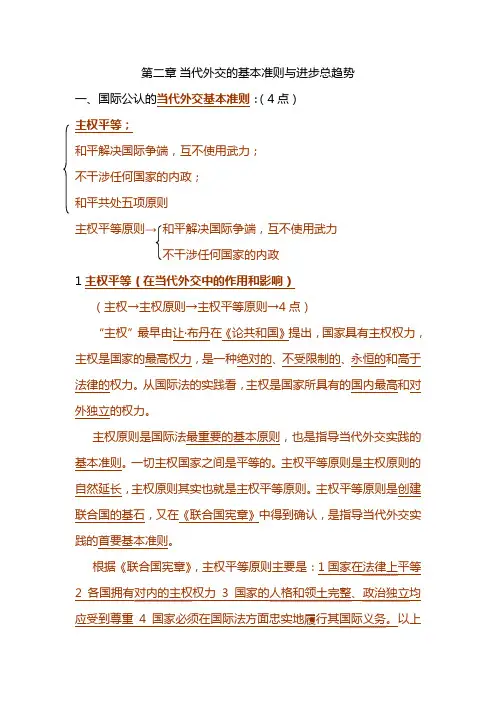
第二章当代外交的基本准则与进步总趋势一、国际公认的当代外交基本准则:(4点)主权平等;和平解决国际争端,互不使用武力;不干涉任何国家的内政;和平共处五项原则主权平等原则→和平解决国际争端,互不使用武力不干涉任何国家的内政1主权平等(在当代外交中的作用和影响)(主权→主权原则→主权平等原则→4点)“主权”最早由让〃布丹在《论共和国》提出,国家具有主权权力,主权是国家的最高权力,是一种绝对的、不受限制的、永恒的和高于法律的权力。
从国际法的实践看,主权是国家所具有的国内最高和对外独立的权力。
主权原则是国际法最重要的基本原则,也是指导当代外交实践的基本准则。
一切主权国家之间是平等的。
主权平等原则是主权原则的自然延长,主权原则其实也就是主权平等原则。
主权平等原则是创建联合国的基石,又在《联合国宪章》中得到确认,是指导当代外交实践的首要基本准则。
根据《联合国宪章》,主权平等原则主要是:1国家在法律上平等2各国拥有对内的主权权力 3国家的人格和领土完整、政治独立均应受到尊重 4国家必须在国际法方面忠实地履行其国际义务。
以上四条是相辅相成的。
最后一点说明主权国家在对外关系中不能以行使主权为借口而为所欲为,把自己的主权意志强加于另一国。
一个国家有权维护自己的主权,同时也负有尊重别国主权的义务。
2和平解决国际争端,互不使用武力这一原则为联合国宗旨(维持国际和平与安全)服务,也是主权平等原则的合乎逻辑的引申。
一国对别国以武力相威胁或使用武力,以非和平方式解决与别国争端就是对对方主权的不尊重。
和平解决国际争端的传统方法有谈判、斡旋、调停和仲裁四种。
前三种是外交方法或政治解决,最后一种是法律的方法即司法解决。
司法解决也要经过当事国的同意,也需通过外交途径。
3不干涉任何国家的内政是主权原则的自然延伸。
最早见诸于18世纪末法国大革命时期的宪法。
是国际普遍公认的一项基本准则。
联合国虽然是一个具有普遍权威的世界组织,对会员国具有约束力,但它无权干涉会员国的内部事务。
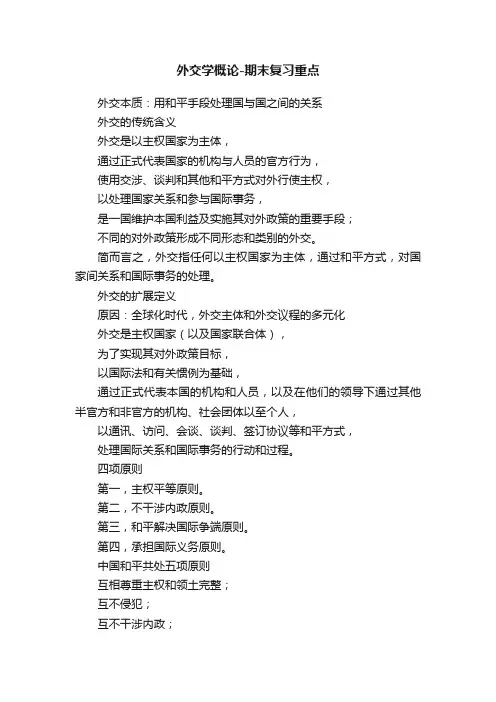
外交学概论-期末复习重点外交本质:用和平手段处理国与国之间的关系外交的传统含义外交是以主权国家为主体,通过正式代表国家的机构与人员的官方行为,使用交涉、谈判和其他和平方式对外行使主权,以处理国家关系和参与国际事务,是一国维护本国利益及实施其对外政策的重要手段;不同的对外政策形成不同形态和类别的外交。
简而言之,外交指任何以主权国家为主体,通过和平方式,对国家间关系和国际事务的处理。
外交的扩展定义原因:全球化时代,外交主体和外交议程的多元化外交是主权国家(以及国家联合体),为了实现其对外政策目标,以国际法和有关惯例为基础,通过正式代表本国的机构和人员,以及在他们的领导下通过其他半官方和非官方的机构、社会团体以至个人,以通讯、访问、会谈、谈判、签订协议等和平方式,处理国际关系和国际事务的行动和过程。
四项原则第一,主权平等原则。
第二,不干涉内政原则。
第三,和平解决国际争端原则。
第四,承担国际义务原则。
中国和平共处五项原则互相尊重主权和领土完整;互不侵犯;互不干涉内政;平等互利;和平共处。
外交特权与豁免外交特权,是指一国派驻外国的使馆及其人员享有的超越接受国国内法赋予其法人与自然人的权益。
外交豁免,是指一国派驻外国的使馆及其人员享有的免除接受国法律条款的待遇,本质上也可包括在外交特权之内。
外交使团和外交人员应享的不可侵犯性第一,使馆馆舍不可侵犯。
第二,使馆档案和文件不受侵犯。
第三,外交代表人身不受侵犯。
第四,外交通讯不可侵犯。
外交使团和外交人员应享的管辖豁免第一,刑事豁免。
第二,民事豁免。
第三,行政豁免。
第四,无作证之义务。
外交使团和外交人员应享的外交特权第一,免纳直接捐税。
第二,免纳关税。
第三,行李免检待遇。
第四,其他特权。
内容:外交使节和外交代表机关,有权在使馆馆舍、外交机关的办公处、外交人员的寓所及其交通工具上使用派遣国的国旗或国徽;在接受国的礼仪庆典活动场合,外交使节拥有占有荣誉地位的权利;除为国家安全而由法律禁止或限制进入的区域之外,接受国应确保外交人员拥有在其境内行动及旅行的自由;外交代表享有免除适用接受国施行的社会保险办法的特权;外交代表享有免除一切个人劳务和所有各种公共服务的特权;外交代表享有免除关于征用、军事募捐、军人住宿等军事义务的特权。
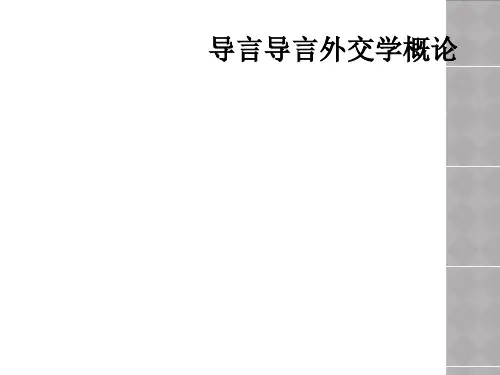
外交学概论复习整理外交学概论复习整理1、什么是外交:外交是以主权国家为主体,通过正式代表国家的机构与人员的官方行为,使用交涉、谈判和其他和平方式对外行使主权,以处理国际关系和参与国际事务、是一国维护本国利益及实施其对外政策的手段。
广而言之,外交指任何以主权国家为主体,通过和平方式,对国家间关系和国际事务的处理。
2、外交有何功能:1、外交促进世界政治各种行为体之间的交流。
2、外交促进谈判以达成协议。
3、外交收集外国的信息和情报。
4、外交减少国际关系中的摩擦。
5外交具有在国际社会代表本国和本国人民的象征性作用。
3、我国春秋时期的外交活动主要有哪些形式(简答):1盟会:“会”为国际会议,“盟”为缔结条约。
盟会即双方或多方的君主为了商讨友好,订主结盟,签订和约等进行聚会。
2聘问:有关修好、庆贺、吊唁、通报情况、解答质疑、探听别国虚实等。
一国的君主常派大臣或使节前往别国进行聘问。
3质:两国友好表示信义,往往以国君的公子为人质。
在两国不友好的时候也有以人为质的。
4奔:类似如今的政治避难(如公子重耳)。
5平:战后讲和。
6朝:国君互访。
4、什么是聘问(春秋时期):见上条5、西方语言中的“外交”一词源于何处?古希腊语(古希腊的使节和外交代表团出使各个城邦时,要持有君主或元老院发给的确认其全权的委任书,即diploma,后来由此演化出大多欧美语言中的外交一词)6、简述古希腊外交对后世的影响:到公元前5世纪,希腊的外交方式和外交原则发展成为地中海沿岸国家公认的制度。
到公元前3世纪,这个外交制度形成了希腊化的地中海体系。
生活在这一体系中的各个国家相互往来,要受公认的某些外交规则和外交习惯所支配,从而形成一个统一的区域性的国际社会。
古希腊人提出的“国家平等”和“国际社会”等概念,以及确立的一些外交原则对后世外交有巨大影响。
7、古罗马外交都有哪些显著特点:注重法律的外交。
1对何种情况下可以使用战争、如何开战、战后如何处理敌人都有明确的法律规定。
小马哥背死你(八)一.外交与外事的关系(简答)1.广义外交与广义外事广义外交:外交是主权国家以及国家联合体为了实现其对外政策目标,以国际法和国际惯例为基础,通过代表本国的最高领导人和以专职外交部门为核心的中央政府部门,以及它们的领导下的半官方非官方组织、民间团体、个人,通过会谈、谈判、访问,签订协议等和平方式处理国际关系国际事务的行动和过程。
广义外事:外事是中央政府、政党、议会、军队、民间团体以及个人的对外交往活动。
关系:广义外交是广义外事的一部分。
广义外事中不直接服务于国家利益的对外交往活动不能称为外交。
2.狭义外交与狭义外事狭义外交:外交是谈判的艺术。
狭义外事:除了中央政府之外的各种机构、团体、个人进行的对外事务、对外活动、对外工作。
二.外交与武力的关系(简答)1.武力是外交的后盾:武力的存在其本身对另一国的谈判立场产生心理上的影响。
2.外交涉及武力的非暴力使用:包括武力威慑和武力威胁。
这两者都不涉及武力的直接使用,而是通过表达使用武力的决心来增强本国在谈判中的讨价还价地位。
3.使用武力的全过程都需要外交:之前寻找盟友孤立对手,之中寻求外交解决的可能性,之后落实战后安排。
三.外交团(名解)1.由同驻一国的所有外国外交官所组成要求:由外交代表人员组成,不是由外交代表机关组成。
不包括使馆一般工作人员不包括驻在国本国的外交官不包括驻在国其他城市的领事官(有些国家包括外交官的配偶和子女,有些国家只包括馆长)四.政治庇护(名解)请求整治庇护:一国公民因政治原因逃往他国请求准许居留。
给予政治庇护:他国接受上述逃亡者,不予引渡准予居留。
五.外交庇护(名解)一国公民因政治原因要求驻本国的他国使馆给予庇护无论题目是外交庇护还是政治庇护,两个都要回答六.人权的国际保护(简答)1.人权的内涵:包括西方国家强调的“人生而自由和平等”的权利以及发展中国家的生存权、发展权等集体人权。
2.为什么要保护人权:有些国家不能保护人权:战争、国力不足有些国家不愿保护人权:种族歧视、屠杀3.谁来保护人权:大国、邻国、国际组织(联合国、红十字会)七.全球化时代的外交1.主客体多元化:主体多元化:主权国家数量增加;客体多元化:主权国家、政府间非政府间国际组织、跨国公司、有影响力的个人数量增加。